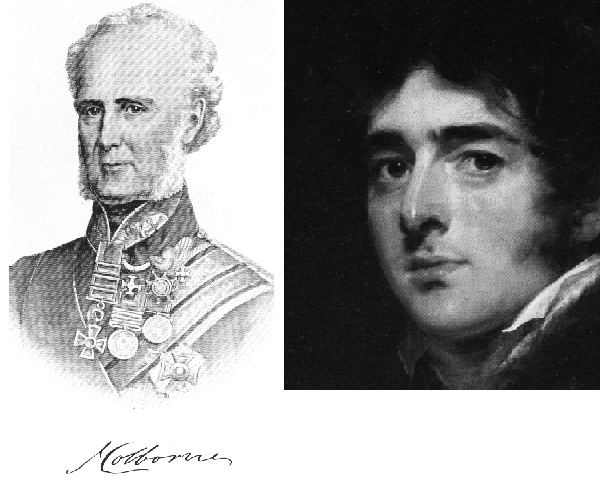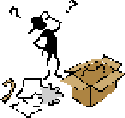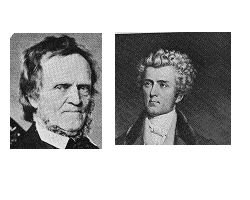
foreword | Historical Narratives | Resources | Links | Contact
FRANCIS BOND HEAD, PART 2
History is shaped by the choices people make which are not always rational.
"The chiefest authors of revolution have been not the chimerical and intemperate friends of progress but the blind abstractors of progress; those who, in defiance of nature struggle to avert the inevitable future, to recall the irrevocable past; who chafe to fury by damming of its course the river which would otherwise flow calmly between its banks which has ever flowed and which, do what they will, must flow forever." -GOLDWIN SMITH
The British Government found the endless problems that seemed to plague Upper Canada tiresome and mystifying. At the end of 1835 yet another Upper Canadian dilemma faced the Colonial Office and it was believed that the little colony's Lieutenant-Governor Sir John Colborne, whose popularity was at an all-time low, was the wrong man to cope with the crisis.
 |
|
Sir John Colborne & Lord Melbourne |
Lord Melbourne, the British Prime Minister, wondered wearily whether the colony could ever be made secure. Its English population, he said, were loyal "according to their own fancy providing they have their own way in everything."
A dilemma was brewing in Upper Canada and it was about to boil over. Something had to be done. Enter Francis Bond Head. Summoned in the night to a task few would tackle Francis answered the call and now here he was in wintry Toronto prepared for he knew not what. Besides his aide-de-camp, his knighthood and a little knowledge of the lasso, Francis brought no understanding of the colony's political problems. On the rough voyage over, he had had a chance to read and comprehend - well at least to read - what he called "Mr. Mac's heavy book of lamentations," the 7th Report on Grievances in Upper Canada which had been carefully compiled by William Lyon Mackenzie.
In 1832 that "urban rebel" Mackenzie had gone directly to London where he carried his cause to the Colonial Secretary Lord Goderich. To the incensed astonishment of the Tories in Toronto, Mackenzie had received a cordial reception. As result of Mackenzie's mission, Goderich dispatched a long letter to the then governor of Upper Canada, John Colborne, in November 1832 which became known as the Goderich Memorandum. Goderich concluded that a number of things needed to be changed in the distant colony and he directed Colborne to drop the executive's attacks on Mackenzie and to institute several financial and political reforms.
In outraged response Upper Canada's Legislative Council refused to accept Goderich's dispatch. Tory members of the Assembly were equally enraged by the memorandum and rejected Goderich's "ill-informed intervention." Their bitter response indicated that they were just as resolute as the Reformers in opposing imperial commands that conflicted with their own interests. They objected to interference from the Colonial Office if it differed from their point of view. It was their way or no way and they archly informed London that the connection with Crown could be seriously threatened by such wrong-headed meddling of the Colonial Office acting on the wicked and malicious testimony of Mackenzie. "The allegiance of Upper Canadians was fragile and could be disrupted as much by the reluctance of the home government to support the local Tory executive as by the machinations of the unprincipled rebel, Mackenzie." The issue indicated that Upper Canadian Tories were not cringing colonials who would meekly tolerate imperial intervention. Their loyalty to the crown was conditional on the British parliament's partiality to them.
Others might question Head's capability. He never did and within a week of his arrival in frosty Toronto he proclaimed that he had diagnosed the difficulty. He was "a political physician" who had mastered the mystery. He plunged into the dispute feet first, always longing to be a hero but completely lacking the qualifications.
Head was absolutely certain he could "mercilessly destroy them root and branch,"'them' being the pestilential people who went by the name of reformer or republican or democrat. He felt perfectly confident that he would "very soon be able to report proudly that the grievances of Upper Canada were defunct because he had veni-ed, vidi-ed, vici-ed them." [See Below *]
Head had been ordered to mediate between the feuding Tories and Reformers and to be able to do so, he examined documents, dispatches, journals and grievances, most of which he didn't understand.No matter, he was prepared to meet "the arch agitator" himself - William Lyon Mackenzie.
 |
|
|
At 43 Head was two years older than Mackenzie. He met the Little Scot face to face shortly after arriving in Toronto and Head found him personally offensive. It has been suggested that Head's instant aversion to Mackenzie might have had something to do with the fact that aspects of Mackenzie's character reminded Head of his own father.
 |
|
William Lyon Mackenzie & Sir Francis Bond Head |
Mackenzie, said Head, was afraid to look him in the eye. Instead he sat with his feet dangling and his face averted at an angle of about 70 degrees. The "tiny creature" - Mackenzie was barely five feet tall - "raved and ranted in all directions" about grievances here, there, everywhere. "Sir," said Head, pointing to the book of grievances, "let us cure what we have here first." However, said Head, "nothing I could say to this peddler could induce him to face his own report." The book of grievances was "like the repellant end of a magnet" to the radicals, driving them from the very object His Majesty's government expected would attract them.
Then it came to Head in a flash.
In His Own Words
"Although I had arrived in total darkness, the light of truth at once burst upon my mind and I perceived most clearly that the republicans had overreached themselves." He realized immediately that democracy, republicanism, executive responsibility or whatever nauseous name it went by needed to be crushed.
Head's initial actions seemed to confirm the Reformers' mistaken belief that he was a man after their own heart. This resulted more from Head's political gullibility than his partiality to the Reformers' cause. After discussions with the leading reformers, Head agreed to appoint three of their number along with three Tories to the six-man Executive Council on February 20th, 1836. Thirteen days later on March 4th they all resigned. They said that according to the Constitutional Act arbitrary action by the lieutenant-governor was unlawful. Head, whose knowledge of the Act was nearly nil accurately responded in a document that was undoubtedly written by the chief justice that the governor alone was responsible for the conduct of government and need consult the Council only on specified matters. Head flatly refused the Council's unanimous demand that they be consulted on all matters relating to the government.
Angered by the resignations of the Legislative Councillors, the Assembly - Reformers and Tories alike with only two dissenting votes - demanded answers from Sir Francis and set up a committee to get them. Its report released on April 15th was harsh, referring to Head as "a deceitful despot." Name-calling caught on and others suggested Head was a "a liar and a rascal." Then a few really got into the swing of things and offered to "tar and feather the tyrant.",/p>
In a complaint to the Colonial Office it was charged that Head had "deviated from candor and truth." Angered by these personal attacks, Head reacted by dissolving the Assembly and calling an election. It was the most bitter of the province's short history. Head said he would "throw himself on the good sense and good will of the people" and he did just that displaying in the process electioneering skills that won the envy and the anger of all who ran against him.
Sir Francis Bond Head never once let his position as lieutenant-governor interfere with his emotional and highly irregular pitch to the people. While he vehemently opposed democracy as espoused by the Remormers, Head's own method of appealing directly to the people in the election of 1836 was in itself an unconscious acknowledgement of the power of democracy. He stormed about the province cleverly spreading the idea that the British connection was threatened and that the Reformers were in some way in league with the United States. Even anti-reform candidates disliked what they saw, one of them saying, "The governor appears a very clever and most determined man but I don't like the style of his addresses. There is a great want of dignity in them. He talks too much of himself and many of his comments look like electioneering addresses. His speeches, however, are well received by the profanum vulgus"(the common people)
Head's appeal was direct and simple: a vote for the Conservatives [Tories] was a vote for loyalty, order and prosperity. A vote for the Reformers represented only disloyalty and the menace of "outside intervention." He never explained what this might be, but he likely meant either American or French Canadian interference. In the name of the loyal militia he taunted, "Let them come, if they dare!" Head's fear-mongering electioneering won the day: Tories elected 44; Reformers elected 18.
The appeal to British loyalty might have been enough to win the election, but the 'constitutionalists,' as the Tories now called themselves also relied on the time-honoured techniques of early Canadian elections. Riot, intimidation, bribery, corruption, biased returning officers and the careful selection of polling places all contributed to the lopsided result. Reformers charged that bribery not boldness was the reason for Head's success on the hustings and that violence and intimidation had ensured a Conservative victory. "Orangemen running up and down the streets crying five pounds for a liberal (reformer) and if any man said a word contrary to their opinion he was knocked down; and all this in the presence of magistrates and judges who made use of no means to prevent these outrages." "The election occurred on the first of July, 1836," wrote W. H. Merritt of Welland Canal fame, "and it was a gathering which for riot and drunkenness exceeded everything he had ever seen before."
Sir Francis declared that he had "contended on the soil of America with Democracy" and had won. In fact, Head's victory vindicated democracy. After the 1836 election Head wrote the Colonial Office in triumph. "Nothing can be brighter than the moral and political state of the Canadas. All is sunshine and colour of rose." When Head opened the Legislature after the election he commended the "loyal feeling" and the "stillness and serenity" of the public mind. Even as he uttered these words a bitterness permeated the province that within a year flamed forth into rebellion.
By a strange twist of fate Head's electoral victory really represented his defeat. Downing Street was dumbfounded when they heard of Head's unorthodox behaviour during the election. When ordered to explain, Head admitted that such tactics were "not exactly according to Hoyle," but, he countered, "Do you think Revolutions are made with rose water?" His "plain, homely language" may have astonished the Colonial Office but he boasted it had gained him "herds of friends." Others countered that it was not friendship and boldness but bribery that had led to Head's success on the hustings. His opponents charged that violence and intimidation were freely used to ensure a Conservative victory. Head had also threatened the loss of the basic necessities of life when he repeatedly reminded the electors that "if you dispute with me you will only quarrel with your bread and butter." While he may not have "stolen the election" his unprecedented involvement in the political process and his uncompromising hostility towards the Reformers resulted in a rift and a rage in the province that led directly to the Rebellion of 1837.
In October 1837 a Reform rally in St. Thomas set forth its grievances in a resolution that is compared to the Declaration of Independence. "That time after time, both in this province and in Great Britain, most loyally, nay most servilely, have we petitioned for a redress of the long and frightful catalogue of the wrongs of Canada. Our prayers have been spurned and our feelings have been deeply wounded by the insults that have accompanied the contemptuous disregard of our most humble supplications for justice. We have too long hawked our wrongs as the beggar doth his sores, at the fastidious threshold of haughty oppression, when derided and mocked we have been sent empty away. That since our iron-hearted rulers have turned a deaf ear to the voice of our complaints we confiding in the goodness of our cause resting as it wholly does on reason, truth and equity, for its support, will call upon the God of Justice to aid us in our holy struggle as Britons and as men."
The rebellion which followed two months later was one of the few uprisings in history in which those labelled the leading oppressors actually armed themselves and joined the fray. "We saw the Lieutenant Governor in his everyday suit with one double-barrelled gun in his hand, another leaning against his chest and a brace of pistols in his leather belt. Chief Justice Robinson, Judges Macaulay, Jones and McLean, the Attorney-General and the Solicitor-General all with their muskets, cartridge-boxes and bayonets, were standing in the ranks as private soldiers under the command of Colonel Fitzgibbon."
Leading a force comprised largely of Loyalists Fitzgibbon advanced against the rebels in three columns up Yonge Street. Spurred on by the martial music of two bands playing Heart of Oak, the stirring sounds of fife and drum grew ever more faint as the ragtag band of tory brothers disappeared northwards. Shortly after reaching the crest of Gallows Hill,they encountered Mackenzie's band of insurgents marching south. The clash of tory and rebel forces was short and sharp. The nervous, untrained, ill-armed farmers forming the bulk of Mackenzie's forces fired a few rounds and then fled. Mackenzie with a price on his person took off for the border seeking safety in the United States.
The Lieutenant Governor dictated a Proclamation.To the Queen's faithful Subjects of Upper Canada
"The Party of Rebels under their Chief Leaders is wholly dispersed and flying before the Loyal Militia. The only thing that remains to be done is to find them and arrest them." <
For a period following the rout of the rebels Upper Canada erupted in a surge of savage vengeance. While proclamations appealled to "those who have been seduced to join in this unnatural rebellion"to return to their homes and become good and faithful subjects, the word went out to hunt down, seize and punish anyone suspected of being a rebel or a supporter of the lowlife who lauded liberty or advocated democracy.
Trailing the turmoil of the rebellion Head left Upper Canada sure he had saved the colony for the crown. At five o'clock on the afternoon of March 23rd, 1838 Head departed for Kingston on the steamer Transit..There was no official sendoff. There were no speeches to laud his leadership. No one bemoaned his departure. Only polite applause followed the tiny figure as he boarded the vessel and stood on the deck as it eased out into the lake. Head later recalled that when he had doffed his hat and pointed to the British flag,
In His Own Words
"There was a shriek of exclamation rather than a cheer. They well knew what I meant."
 |
|
|
Although it has been announced that Sir Francis would sail from Halifax Bond Head changed his mind for he deemed it safer to go south through the United States. Word had reached Bond that rebels were lying in wait for him and his party so they left the steamer at Kingston and crossed into America on the partially frozen river. Several of the men walked ahead carrying a light boat which they launched whenever the ice became too thin or they came to open water. With Bond in the boat they rowed until they encountered solid ice then they debarked and resumed their walk.
Petrified of possible capture by rebels or their American sympathizers - there was a patriot price of $500 on his head - Bond Head was clad in a rough and ready travelling clothes with high boots and a coonskin cap on his head. He toted two pistols over which his hands hovered nervously because inquisitive Yankees frequently inquired, "Stranger, air you from Cannyday?" In Watertown, New York, Head exchanged his team and sleigh for two saddle horses. Galloping Head was now in his element and he spurred his mount madly along the muddy paths, the tail of his coonskin hat streaming out behind him. He reached New York City without incident.
Head's report on the 1837 rebellion contained the following introduction.
"I have the honour to inform your Lordship that on Monday, 4th inst. , this city was in a moment of profound peace suddenly invaded by a band of armed rebels amounting, according to a report, to 3000 men (but in actual fact to about 500) and commanded by Mr. McKenzie, the editor of a republican newspaper, Mr. Van Egmond, an officer who had served under Napoleon, Mr. Gibson, a land-surveyor, Mr.Lount, a blacksmith, Mr. Lloyd, and some other notorious characters. The crisis important as it was was one I had long earnestly anticipated.
"Prior to it breaking out I observed with satisfaction that Mr. M'Kenzie was pursuing a lawless course of conduct which I felt it would be impolitic for me to arrest. For a long time he had endeavoured to force me to buoy him up by a Govt. prosecution but he sunk in proportion as I neglected him until becoming desperate, he was eventually driven to reckless behaviour which I felt confident would very soon create its own punishment. As soon as, by most wicked misrepresentations, he had succeeded in seducing a number of well-meaning people to join these squads, his next step was to prevail upon a few of them to attend their meetings armed, for the alleged purpose of firing at a mark. He succeeded in inducing them to believe he was everywhere strongly supported and that his means as well as his forces would prove invincible."
Durham in his famous report castigated Head for encouraging Mackenzie and his followers to rebel and he doubtless arrived at this conclusion based on Head's own admission that he allowed unrest and illegal behaviour to go unchecked until it led eventually to the violence he knew would occur.
Bond Head is remembered as a peculiar figure who conducted official audiences with his short legs stuck rigidly out in front of him. His contribution to the colony received no acclaim from England and his return to London went unnoticed by officialdom. He deeply resented what he thought was a hurtful slight to a dedicated civil servant and when he received no satisfaction from the Colonial Secretary, Head decided to take his grievances directly to the top. He called upon Prime Minister Lord Melbourne at Downing Street.
After a lengthy delay in the waiting room Head was ushered into the presence of the Prime Minister who was shaving.
 |
|
|
Head protested at length about the ingratitude of the government towards the person who had served it well. Finally in frustration he shouted
In His Own Words
"I saved the colony!
"So you did, so you did" said an impassive Melbourne who calmly went on shaving. Emboldened by this mild response from the prime minister Head pressed on with his defence praising his policies and justifying his actions. Finally, Melbourne put down the razor, wiped off the last bit of lather, turned, stared directly at Head and said,
In His Own Words
But you see Head, you're such a damned odd fellow."
Fate played a practical joke on Francis Bond Head. At that period of Upper Canada's history this rash and imprudent little man caused more to occur than he could ever have imagined. Paradoxically both Bond Head and William Lyon Mackenzie were jointly responsible for the ragtag rebellion from which came important results, the very same results which Head had worked so hard to prevent.
Sir Francis Bond Head attempted to find other ways in which to serve his country but he failed to find any takers. Head's fluent pen produced a number of books and articles bearing such titles as Stokers and Pokers and Hi-ways and Dry-ways. The least entertaining of his books was a light and lively account of his Canadian adventures titledA Narrative of the Canadian Rebellion written in 1839. In it he set down this description of Upper Canada's oligarchy, the Family Compact.
"The family compact of Upper Canada is composed of those members of its society who, either by their abilities and character have been honoured by the confidence of the executive government, or who by their industry and intelligence have amassed wealth. The party I admit is comparatively a small one but to put the multitude at the top and the few at the bottom is a radical reversion of that pyramid of society which every reflecting man must foresee can only end by its downfall."
The British public received a different version of this small clique from the pages of the Thunderer, the Times of London. In an editorial dated 17 May, 1849 the following appeared. "In Canada we behold an oligarchy which has long revelled in the plunder of a province, labouring to overawe a Senate, to bully a Governor, to paralyze a majority and to degrade a people merely that they may again monopolize office and divide official booty. The rebels of 1837 were patriots and honourable men compared with their opponents. The former fought for free and equal institutions; the latter for the ascendance of a faction and a race."
Dubbed "Sir Francis Wronghead" by the publication Punch, Head retired and lived for another 37 years writing and riding to the hounds until aged 75. At the time of Canada's confederation in 1867, Head requested and received an appointment to the Queen's Privy Council for his "contribution to the development of Canada." The honour, which was bestowed on him by Queen Victoria on December 21st, 1867, was termed by the prime minister Lord Derby "a tardy act of justice." 'Galloping Head' died at his home in Croydon at the age of 82 on July 20th, 1875.
[*] He 'came, he saw, he conquered them'.Copyright © 2013 Website Administrator